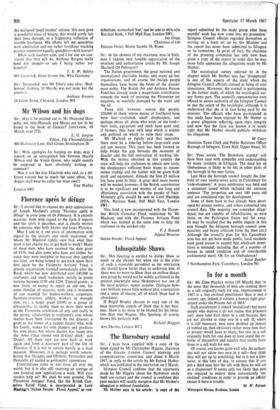Sir: In the absence of my chairman, now in Italy,
may I express very humble appreciation of the excellent and authoritative article by Mr Joseph Macleod (24 February)?
The Italian government, the great national and international charitable bodies, and many ad hoc organisations, and of course the Italian people themselves, have borne the brunt of the disaster most nobly. The British Art and Archives Rescue Fund has already made a magnificent contribution towards the work of restoring the Florentine art treasures, so woefully damaged by the water and the oil.
There still, however, remain the people; 250,000 of them, whose means of livelihood have been lost—craftsmen, small shopkeepers, and perhaps above all, those who work on the land— their tools, equipment and stock have gone and, if farmers, they have only land which is sodden and polluted on which to raise their crops.
Mr Macleod so rightly said that inevitably there must be a time-lag before large-scale state aid can mature. This trust has been formed to help bridge the gap between the moments of disaster and the, full restoration of working life. With the money obtained in this country the trust will help the craftsmen to obtain new tools, the shopkeepers sufficient basic wares to recom- mence trading and the farmer will be given both stock and equipment. Already the first 25 million lira have gone to Italy. A great deal more money will be needed, however, if the British contribution is to be significant and worthy of our long and affectionate association with the people of Italy. Monetary gifts should be sent to Lord Hastings, IPFA, Barclays Bank, Pall Mall East, London SWl.
This fund is now incorporated with the Floren- tine British Consular Fund, mentioned, by Mr Macleod, and with the Florence Artisans Fund which was formed at the same time to help the craftsmen in the stricken city.






























 Previous page
Previous page